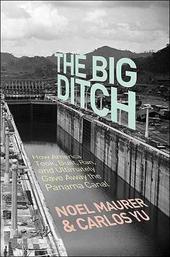
|
The Big Ditch: How America Took, Built, Ran, and Ultimately Gave Away the Panama Canal
Hardback
Main Details
| Title |
The Big Ditch: How America Took, Built, Ran, and Ultimately Gave Away the Panama Canal
|
| Authors and Contributors |
By (author) Noel Maurer
|
|
By (author) Carlos Yu
|
| Physical Properties |
| Format:Hardback | | Pages:440 | | Dimensions(mm): Height 235,Width 152 |
|
| Category/Genre | History of specific subjects
Economic history |
|---|
| ISBN/Barcode |
9780691147383
|
| Classifications | Dewey:386.44 |
|---|
| Audience | | Postgraduate, Research & Scholarly | |
|---|
| Illustrations |
6 Maps
|
|
Publishing Details |
| Publisher |
Princeton University Press
|
| Imprint |
Princeton University Press
|
| Publication Date |
28 November 2010 |
| Publication Country |
United States
|
Description
On August 15, 1914, the Panama Canal officially opened for business, forever changing the face of global trade and military power, as well as the role of the United States on the world stage. The Canal's creation is often seen as an example of U.S. triumphalism, but Noel Maurer and Carlos Yu reveal a more complex story. Examining the Canal's influence on Panama, the United States, and the world, "The Big Ditch" deftly chronicles the economic and political history of the Canal, from Spain's earliest proposals in 1529 through the final handover of the Canal to Panama on December 31, 1999, to the present day. The authors show that the Canal produced great economic dividends for the first quarter-century following its opening, despite massive cost overruns and delays. Relying on geographical advantage and military might, the United States captured most of these benefits. By the 1970s, however, when the Carter administration negotiated the eventual turnover of the Canal back to Panama, the strategic and economic value of the Canal had disappeared. And yet, contrary to skeptics who believed it was impossible for a fledgling nation plagued by corruption to manage the Canal, when the Panamanians finally had control, they switched the Canal from a public utility to a for-profit corporation, ultimately running it better than their northern patrons. A remarkable tale, "The Big Ditch" offers vital lessons about the impact of large-scale infrastructure projects, American overseas interventions on institutional development, and the ability of governments to run companies effectively.
Author Biography
Noel Maurer is associate professor of business administration at Harvard Business School. His books include "The Power and the Money, The Politics of Property Rights", and "Mexico since 1980". Carlos Yu is an economic historian and private consultant based in New York City.
Reviews"The history of the Panama Canal's construction, operation, and eventual transfer to the Panamanian government offers a fascinating window on US imperialism in the 20th century. Maurer and Yu provide a deeply researched and highly readable economic history of the canal."--Choice "[T]his book teaches us important lessons on the global consequences of imperial ventures with particular insights on institutional development, economic and political constraints and power."--Leticia Arroyo Abad, EH.Net "[T]he authors' sophisticated and persuasive analysis helps illuminate the economic history--and consequences--of the Panama Canal. This book brings new questions and answers to the study of U.S. imperialism and simultaneously demonstrates the usefulness of economic history for a field often dominated by cultural and social methodologies."--Julie Greene, Journal of American History "The Big Ditch strikes an interesting balance in addressing both the political and economic dimensions of imperialism and the practices of empire, and fills a gap by providing a comprehensive analysis of the Panama Canal through a century of its history."--Joseph Michael Gratale, European Journal of American Studies
|